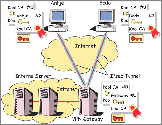|  NETWORKING NETWORKINGSAFER ENVIRONMENT INITIATIVE 
It is obvious that, the present approach to violent crimes in Nigeria has failed. Nigeria must evolve with the rest of the world and build the circle of safety.
The Safer Environment Initiative (SEI) aims to build a security system using video surveillance and analytics to cover the entry/exit points and crime prone areas of the state or nation, to deter and control crime AT NO COST TO THE STATE OR FEDERAL GOVERNMENT.
SECURITY REPORTS:
UK Foreign and Commonwealth Office; "There is a high threat from terrorism. There is a threat of retaliatory attacks following the French intervention in Mali.
There is a high threat of kidnap throughout Nigeria. Kidnaps can be for financial or political gain, and can be motivated by criminality or terrorism.
There are high levels of violent street crime (muggings, kidnappings, carjacking and armed robbery) in the south of the country, even in comparatively safe areas of Lagos. Most attacks happen from 22:00 onwards
Avoid any travel after dark outside city centres. Take care after dark within cities. Avoid quieter and poorly lit roads. Be particularly vigilant when sitting in traffic jams or at traffic lights. Keep car windows up and doors locked, and make sure valuables are out of sight. If you feel your vehicle is being followed, drive to the nearest place of safety (e.g. the nearest police station)." www.fco.gov.uk
US Government: “Violent crimes committed by individual criminals and gangs, as well as by some persons wearing police and military uniforms, occur throughout the country, especially at night. Visitors and residents have experienced armed muggings, assaults, burglaries, carjacking, rapes, kidnappings, and extortions, often involving violence.
Home invasions remain a serious threat, with armed robbers accessing even guarded compounds by scaling perimeter walls; following or tailgating residents or visitors arriving by car into a compound; or subduing guards to gain entry into homes or apartments.
Armed robbers in Lagos also access waterfront compounds by boat. U.S. citizens, as well as Nigerians and other expatriates, have become victims of armed robbery at banks, grocery stores, and on airport roads during both daylight and evening hours.
Law enforcement authorities usually respond slowly or not at all, and provide little or no investigative support to victims. U.S. citizens, other expatriates, and Nigerians have experienced harassment and shakedowns at checkpoints and during encounters with Nigerian law enforcement officials. Travelling outside of major cities after dark is not recommended due to crime and road safety concerns."
"(Travellers) must receive advance clearance by the U.S. Mission as being mission-essential. U.S. citizens should be aware that in light of the continuing violence, extremists may expand their operations beyond northern Nigeria to the country's southern states". www.travel.state.gov
The present state of the nation and recent developments made it inevitable that these activities (terrorism, armed robberies and kidnapping) will not subside or abate in the future but escalate.
It shouldn`t be hard to realize that the way security is perceived in the state must change, we have to move our mind set from the traditional personnel (Operation Burst. JTF, Vigilantes) as they cannot be everywhere, every time, and move to technology enabled security systems (TESS).
We must know that Kidnapping, Armed Robberies, and other terrorist activities not only resultin losses in terms of human causalities, property destruction, and economic effects but also results in profound damage to public morale (local and International)and confidence in the State and Federal Government.
Intelligence gathering, video surveillance and fingerprinting technology are the most effective crime deterrent and control solutions available today.
TECHNOLOGY ENABLED SECURITY SYSTEM (TESS) IN NIGERIA
The use of video surveillance and analytic applications are effective tools to deter and control crime, especially violent crimes like terrorism.
Some of the benefits of TESS include;
It also allows corporations to set up CCTV systems at strategic locations on Build Operate and Make Accessible (BOMA) in exchange for advert spaces and tax relief.
The need for SEI arises due to the difficulties encountered by the Government in installing and maintaining functional CCTV systems in the country.
Some of the challenges to a functional system in Nigeria are; POWER, TRANSMISSION, EQUIPMENT QUALITY, MAINTENANCE AND RECORD KEEPING.
The Safer Environment Initiative supported by the private sector, it will enable the Government to concentrate on providing core services to the citizens.
We recommend a PPP/GCP approach to having an effective technology enabled security system in Nigeria, because according to a World Bank report, “Inadequate infrastructure is a constraint on growth worldwide, and particularly in developing countries. Infrastructure services are often inadequate to meet demand, resulting in congestion or service rationing.
Infrastructure services are also often of low quality or reliability, while many areas are simply un-served.
This poor infrastructure performance reflects pervasive challenges facing governments.
First, most countries simply are not spending enough to provide the infrastructure needed.
Secondly, poor planning and coordination, weak analysis underpinning PROPOSAL selection, pursuit of political gain, and corruption, mean that the limited resources are often spent on the wrong projects.
Moreover, the delivery of infrastructure assets and services often disappoints—construction of new assets costs more and takes longer than expected, and service delivery is weak.
Finally, infrastructure assets are often poorly maintained, increasing costs and reducing benefits.” World Bank Institute.
For the reasons stated above, PPP/GCP becomes a viable alternative for Governments in the provision of infrastructure.
Methodology;
PLEASE CONTACT US FOR A QUOTE
|
|||||
